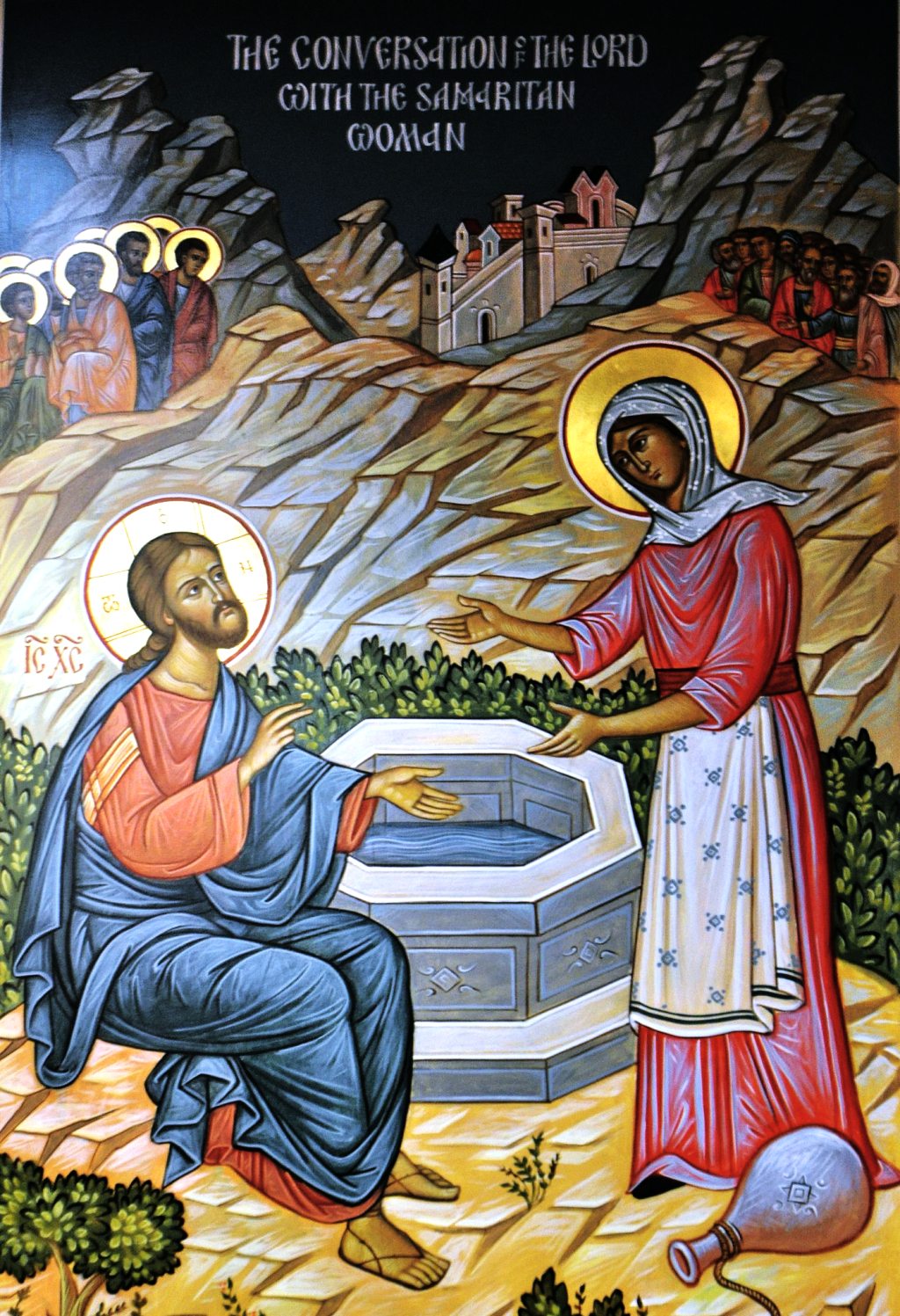Sermon on the Fifth Sunday of Pascha – The Samaritan Woman

In the Name of the Father, and of the Son, and of the Holy Spirit. Amen.
Beloved brothers and sisters in Christ,
Today, the Holy Church celebrates the encounter of our Lord with the Samaritan woman, as recounted in the Gospel of John, chapter 4. This passage is rich with profound theological and spiritual truths that guide us towards a deeper understanding of our faith and our relationship with God.
As we meditate on this gospel, let us first consider the setting and the participants. Our Lord, wearied from His journey, sits by Jacob’s well in the Samaritan town of Sychar. It is around noon, the hottest part of the day, when a Samaritan woman comes to draw water. This woman is not named in the Gospel, but according to tradition, she is known as Saint Photini, meaning “the enlightened one.”
Our Lord initiates the conversation with a simple request: “Give me a drink.” This may seem ordinary, but it is extraordinary considering the cultural context. Jews and Samaritans shared a long-standing enmity, and Jewish men would typically avoid speaking to women in public, let alone a Samaritan woman. Yet, Christ transcends these social barriers, showing us that His message of salvation is for all people, regardless of ethnicity, gender, or past sins.
The conversation quickly moves from the physical need for water to the deeper spiritual thirst that resides in every human soul. Our Lord tells the woman, “Everyone who drinks of this water will be thirsty again, but whoever drinks of the water that I will give him will never be thirsty forever. The water that I will give him will become in him a spring of water welling up to eternal life” (John 4:13-14). Here, our Lord speaks of the living water, the grace of the Holy Spirit, which alone can satisfy our deepest longings and bring us true fulfillment.
The Samaritan woman is intrigued and asks our Lord to give her this living water. In response, Christ gently leads her to a recognition of her own spiritual state. He asks her to call her husband, and when she replies that she has no husband, our Lord reveals His divine knowledge of her life: “You are right in saying, ‘I have no husband’; for you have had five husbands, and the one you now have is not your husband” (John 4:17-18). This revelation brings her to the realization that she is speaking with a prophet, and she begins to perceive that our Lord is more than a mere man.
Through this encounter, we see the transformative power of Christ’s love and truth. The woman’s past, marked by broken relationships and sin, does not define her future. Instead, her encounter with our Lord becomes the turning point of her life. She becomes an evangelist, running back to her town to tell others about the Messiah, saying, “Come, see a man who told me all that I ever did. Can this be the Christ?” (John 4:29). Her testimony leads many in her town to believe in our Lord.
This Gospel teaches us several important lessons. First, it reminds us that Christ seeks us out, no matter where we are or what we have done. He meets us at our own “wells,” in the midst of our daily lives and struggles. He knows our hearts and our deepest needs, and He offers us the living water of His grace.
Second, we are called to respond to Christ’s invitation with openness and honesty. Just as the Samaritan woman allowed our Lord to reveal her true condition, we too must be willing to confront our sins and shortcomings, not in despair but with the hope of transformation and healing.
Third, we are reminded of the power of personal testimony. The Samaritan woman’s encounter with Christ led her to share the good news with others, and her simple, heartfelt witness brought many to faith. Each of us, having experienced God’s grace, is called to share it with others, inviting them to “come and see” the goodness of the Lord.
Finally, this Gospel invites us to break down the barriers that divide us, just as our Lord broke through the cultural and religious barriers between Jews and Samaritans. In Christ, there is neither Jew nor Greek, slave nor free, male nor female, but all are one (Galatians 3:28). We are called to see each person as a beloved child of God, worthy of His love and our compassion.
As we continue our journey through this Paschal season, may we drink deeply of the living water that Christ offers us, and may it become a spring within us, welling up to eternal life. Let us go forth with joy, sharing the good news of Christ’s love and salvation with all we meet.
To Him be glory, honor, and worship, together with His eternal Father and His all-holy, good, and life-giving Spirit, now and ever and unto ages of ages. Amen.




